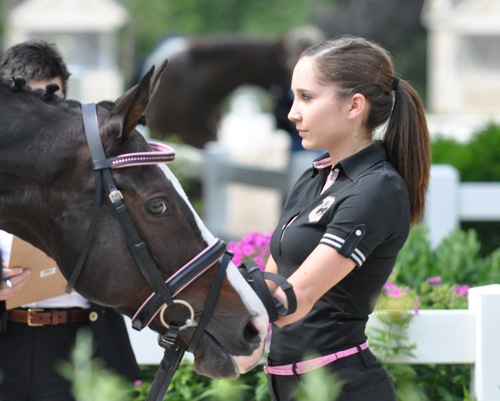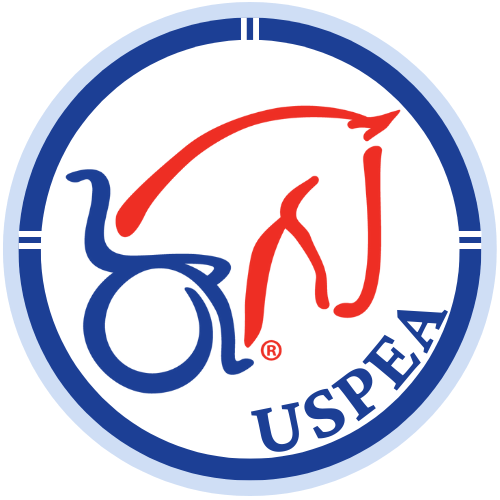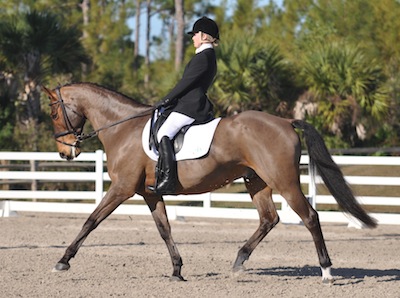Support Links
January 15, 2011
Holly Bergay
January 19, 2011
Jennifer Baker and Duel at the 2010 USEF Para-Dressage National Championships
Jennifer J. Baker
-Grade IV Para-Dressage
-Hometown: Loveland, OH
-Born: November 10, 1963
-Qualified for the 2010 World Equestrian Games (WEG) on a Rhinelander gelding named Duel.
-Competed at the WindReach International Para-Dressage CPEDI3* in Ontario, Canada.
-Rode Akiko Yamazaki’s horse Kranak at the 2010 WEG.
Article from The Cincinnati Enquirer:
Date: Sunday, August 1, 2010
Written by: John John ston jjohnston@enquirer.com
Website: Cincinnati.com
After Crash, Dressage Rider Gets Back on Horse
Jennifer Baker and her boyfriend were thrown from the motorcycle. She lay in the road, her left thigh bone jutting out of her jeans. Her shin and calf bones were broken, her groin muscles, hip flexors and various ligaments were torn. Oddly, she felt no pain.
She remembers hearing the whup-whup-whup of rotors from the medical helicopter, and the words of the emergency worker who resuscitated her three times as her life was slipping away:
No! Don ‘t do this to us now.
She survived, only to wish she hadn’t.
Baker had been competing in equestrian events most of her life. But her injuries were so severe, doctors said she would never ride a horse again.
“I became extremely depressed,” says the 46-year-old Loveland resident. “I had a lot of suicidal thoughts. I didn’t want to be here anymore.”
That was nine years ago.
Now, Baker knows where she wants to be Sept. 25 through Oct. 10: competing in the World Equestrian Games at Lexington ‘s Kentucky Horse Park .
It will be the first time the U.S. has hosted the event, which will decide the championships of eight equestrian sports. It’s also the first time para dressage, for riders with physical disabilities, will be part of the games.
“This is like the World Cup for the soccer team,” Baker says in her apartment. “It’s the elite of the elite. And I’ve worked so hard, and kept trying and trying…”
In telling her story, she has a message for anyone facing adversity: “I don’t want people to ever give up, because no matter how hard things get…there’s always somebody out there to help you.”
As a little girl she learned to ride bareback in a cow pasture. In time, she became a skilled and decorated rider in many disciplines, including horsemanship, jumping and dressage.
At 19, she was a single mother, raising a son, juggling three jobs. She says her son is the reason she didn’t take her life.
Meanwhile, her mother was building a career as a horse trainer, instructor and horse show manager. Nancy Baker , who owns Wicklow Dressage in Camp Dennison , moved here from Pennsylvania about 10 years ago.
Jennifer stayed in Pennsylvania , training horses and giving lessons. That’s where she met the man with the Harley Davidson .
In January 2001, they were stopped at a traffic light when a car exiting a parking lot hit them broadside.Baker’s right foot was crushed. Her shin bone and calf bones were broken.
She had mostly recovered when the second, more serious accident occurred in October that year.
Neither driver who hit her had insurance, but Baker received enough money to pay her medical bills and send her son to college.
Doctors inserted titanium rods from her hip to her knee, and from her knee to her ankle. Rehab was excruciating. She would learn to walk again, but with a limp. She learned to live with pain.
She had to be carried down the aisle in March 2003 when she married the motorcycle man. It was an abusive relationship, and they divorced within three years.
Baker, who receives disability benefits from Social Security, moved to Southwest Ohio , near her mother. She began volunteering with a program that put people with disabilities on horses. She told herself if they could do it, she could, too.
A friend offered to let her ride a horse.
“It was very, very painful,” Baker says. And yet, “it really brought me back to life.”
Three years ago her mother bought a horse, and Baker couldn’t help but notice the great irony in its name: Harley .
” Harley ended up becoming my four-legged savior,” Baker says. “I don’t think I’ve ever had a horse that loved me as much.”
The duo began competing in para dressage, in which riders are grouped into four classes based on the severity of their disabilities. Baker is classified as Grade IV, the least disabled.
Dressage, which means “training” in French, is sometimes described as equine ballet. It requires human and horse to be in perfect harmony as they perform a combination of movements and gaits. It’s a test of precision and confidence marked by beauty and elegance.
“I don’t feel a lot of pain when I ride,” Baker says. “But when I get off, I can hardly walk.”
Says her mother: “Adversity doesn’t stop her.”
As Baker and Harley rose to a No. 2 national ranking in their class, she set her sights set on the 2010 World Equestrian Games. Then, last fall came heartbreak: Harley tore a ligament in a leg.
Unsure if he would recover in time, Baker spent the winter unsuccessfully searching for a replacement. In the spring, the University of Findlay ‘s Equestrian Studies program offered to loan her one of its dressage champions, a horse named Duel.
In late June, at the para dressage selection trials near Chicago , Baker rode Duel to an eighth-place finish. That put her in excellent position for a spot at the World Equestrian Games, where 10 U.S. horse/rider combinations will compete.
But on the last day of the trials, Baker could tell Duel wasn’t right. The formal diagnosis came July 20: a torn ligament in his front leg. He will heal, but not in time for the games.
“I just wanted to fall on the floor and cry,” she says.
“How she gets the inner strength to overcome all the hurdles placed in her path is a mystery to me,” says a friend, Joanne Gerson of Montgomery . “She grieves her losses and then does not look back. She has no room for self pity.”
And no time for it, either, because she still hopes to compete with the world’s best.
Last week she tried out two dressage horses, including one in California . It has been years since Nancy Baker taught that horse’s owner to ride, “but when I called and said, this is what I need – poof – she was there,” Nancy Baker says.
A U.S. Equestrian Federation committee will view videos of Baker riding the horses before deciding if she will be permitted to compete. That decision could come this week.
Other challenges also remain: Baker has raised about half the $30,000 she’ll need to cover her expenses during the games. Gerson is helping with fund-raising, including a benefit dinner on Saturday; reservations are no longer being accepted.
“This road has been extremely difficult, although it’s been totally amazing, with everybody offering their help,” Baker says.
Some people dream of taking top honors at the World Equestrian Games. But Baker says that for her, just getting there will be as good as gold.

